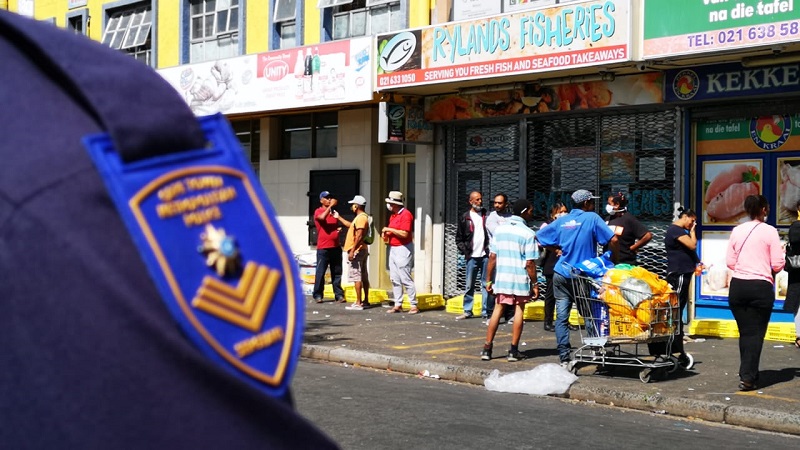As social media hypes up speculation around the nationwide lockdown being extended in South Africa, VOC spoke to an expert in sociology to unpack the probability and consequence of the big “what if” on everyone’s lips. Since the start of the lockdown, many communities have not been complying with the disaster regulations designed to limit the spread of the coronavirus.
To begin with, no extension has officially been confirmed. According to the National Police Minister Bheki Cele, however, what government can accomplish in the next few days is crucial. Cele made an address in Mpumalanga on Tuesday, where he had visited Secunda to inspect if residents are obeying national lockdown regulations.
“The next few days are going to determine which direction we are taking. We would wish to go back to normal life as soon as we can. But we wish to go back there with the people alive. There is no need to rush there when people are sick (and) when people are dying.’
“Human life is the primary task of all of us protecting- that people live and survive this terrible era,” said Cele.
Speaking to VOC on Wednesday, head of the Department of Sociology and Social Anthropology at Stellenbosch University. Professor Lindy Heinecken said that at the moment, an extension could be on the cards.
“I’m afraid that we may be thinking of an extension,” she admitted, adding that a lot of the responsibility lies with citizens.
“The kind of information that I have been following suggests that it would follow a week or a couple of days of reprieve – in other words, a break – and then going into a second cycle and even possibly a third, if necessary. Depending on the extent that citizens actually adhere to the regulations.”
Heinecken added that if citizens co-operate and help contain the virus’s spread, the less likely an extension would be. If it is however extended; it wouldn’t be for as long.
Acknowledging the deep-rooted inequality evident by the number of impoverished communities in the country, the professor held the opinion that the entire operation should not have solely focused on enforcement:
“There should’ve been a two-pronged approach. An approach of, yes, enforcing the strategy that the state has (set out). But, at the same time, there should have been a humanitarian aid mission running alongside that- providing people with basic support in terms of water and necessities.
Having worked in the townships and being witness to the many hardships they’ve become accustomed to living through, she empathised with those who “break lockdown regulations” for survival.
“One of the reasons people are not adhering to this is because they need to actually travel to get food on a daily basis. They haven’t got refrigeration. They haven’t got the ability to carry large amounts of groceries home- those are things that should have been factored into the mission,” she said.
Heinecken explained that Operation Prosper focuses on maintaining law and order. Operation Chariot is more focused on aid relief, which “is not unfamiliar to military (as) they’ve done many humanitarian operations”.
Citing sources, Heinecken said government has been mobilizing all the support possible and has even requested that the reserves volunteer.
“Hopefully if we do go into a second round there will be a greater disaster and humanitarian relief associated with the lockdown. I do see the mission shifting to the more humanitarian operation or a combination between the two, in terms of co-ordination,” she said.
The COVID-19 pandemic has gutted the global economy and created worldwide instability. South Africa is no exception and with an already high unemployment rate as well as many holding temporary jobs, the impact will be felt on both big and small businesses.
“A large sector of our economy is run on informal business and the long-term effect that this (an extension) would have is devastating. Many of the smaller companies have also not been able to continue paying wages to their staff. Those who were in permanent employment have now also not got an income and it will be some time before they can claim Unemployment Insurance Fund (UIF) back,” said Heinecken.
Many have also expressed concern over the accuracy of data being publicized, raising questions of whether or not the infection rate -and possibly death toll- may be higher.
“I don’t want to be a scare-monger-er but I do think they (statistics) are substantially higher. The kind of feedback I’m getting from the defense force is that they are planning for a much greater disaster that many of us are contemplating at this point.”
“I do think there are many cases that are not being reported at this stage. We will get a better sense when there’s more testing which the government is rolling out. It will give you a greater sense of the depth, now we are just seeing the peak,” added Heinecken.
Speaking to recent calls by Western Cape community Safety MEC Albert Fritz call to rope in local Neighbourhood Watch Members, she further encouraged people to put aside their fear and get involved where they can.
“Your Community Policing Forums and organisations do need to come on board here because there must be a greater level of civil society assisting in this pandemic.”
VOC






 WhatsApp us
WhatsApp us 

